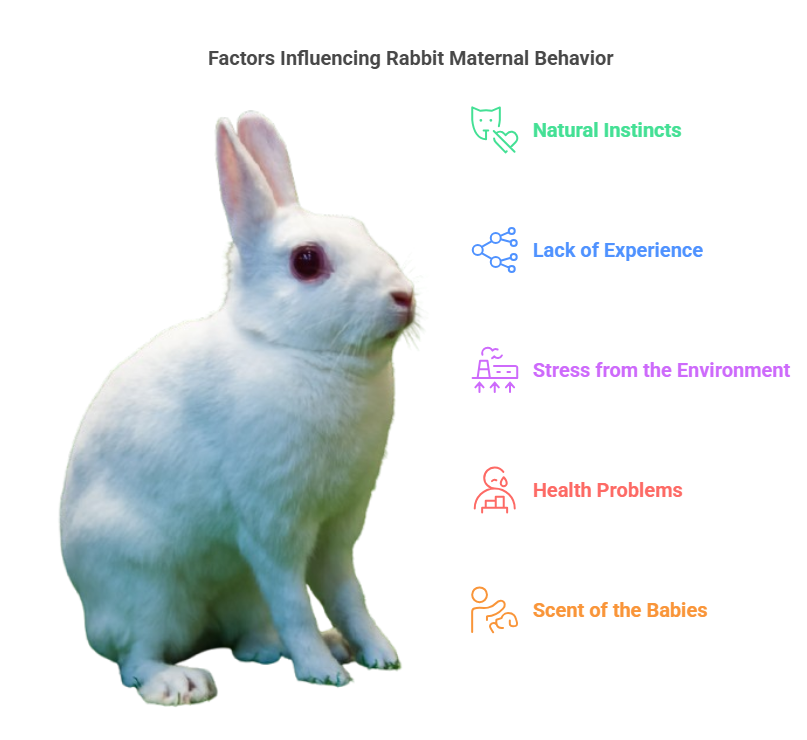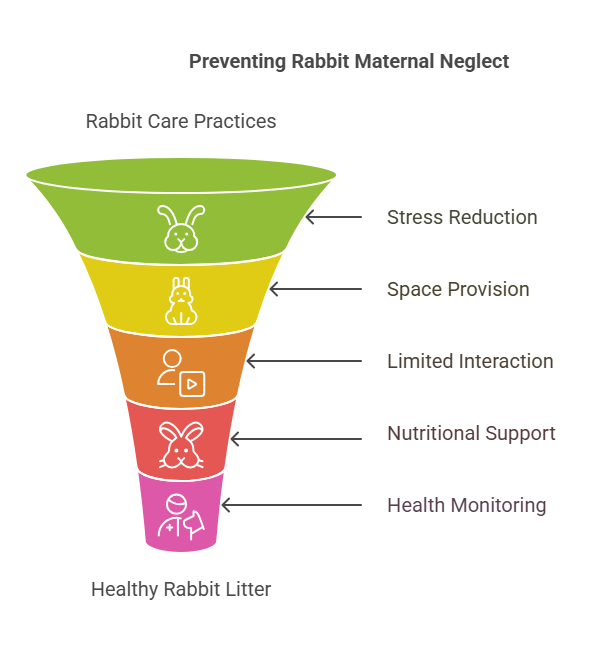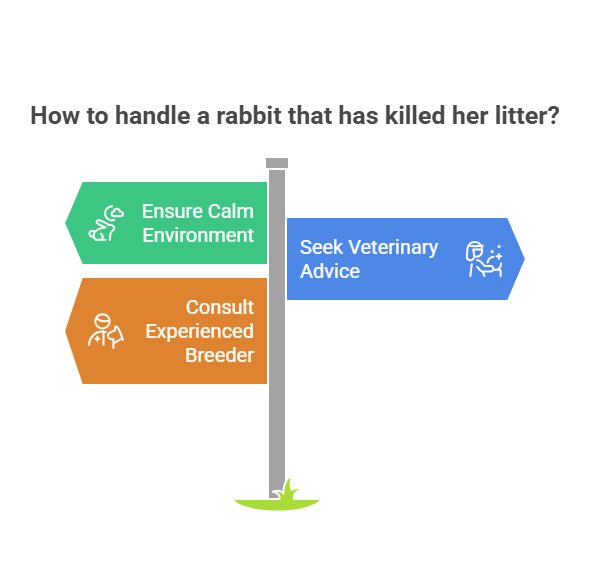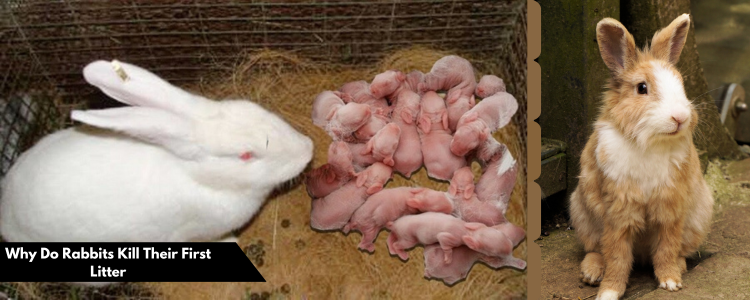Rabbits may kill their first litter due to stress or lack of reproductive experience. These factors can make a mother rabbit feel threatened by her babies, causing her to harm or kill them. When you first become a rabbit owner, it’s not uncommon to feel confused or upset by a troubling behavior: your rabbit killing its first litter. It’s one of the most debated and misunderstood actions in the world of rabbit care. Understanding why this happens is crucial if you want to protect your rabbits and ensure a healthy environment for future litters.
But why does this happen? Let’s dive deep into the world of rabbits and uncover the reasons behind this shocking behavior.
Why Do Rabbits Kill Their First Litter?
Rabbits may kill their first litter due to stress, inexperience, or natural instincts. A first-time mother may struggle with maternal behavior, while stress from environmental factors or poor health can increase the likelihood of harm. Rabbits are sensitive to unfamiliar scents and might perceive their offspring as threats. Ensuring a calm, secure environment, proper nutrition, and minimal human interference can help prevent this tragic behavior in future litters.

Natural Instincts at Play
Rabbits are prey animals, which means their survival instincts are deeply embedded in their DNA. These instincts can drive them to behave in ways that might seem cruel or confusing, but they are often designed to protect the mother and her future offspring. Some of the most common reasons why rabbits may kill their first litter include stress, lack of experience, or even instinctual behaviors linked to survival.
Lack of Experience
A common reason why rabbits kill their first litter is simply because they are inexperienced mothers. First-time rabbit mothers don’t always know how to care for their babies. They may become overwhelmed or confused about what to do, leading to unintentional harm. A mother rabbit’s instincts may not fully kick in if she hasn’t been around other rabbits or experienced motherhood before.
According to Dr. John Doe, a veterinarian specializing in small animals,
“Rabbits often don’t have the maternal instincts that some other species do. Inexperience is one of the leading reasons for this tragic behavior.”
Stress from the Environment
Stress can significantly affect a rabbit’s behavior. A new or noisy environment, frequent human interaction, or the presence of predators can all contribute to stress. When a mother rabbit feels threatened or scared, she may act unpredictably. Stress causes a release of hormones that can lead to aggression or even the killing of the babies.
A study from the University of California found that stressed rabbits were 30% more likely to abandon or harm their newborns, especially if they felt threatened by unfamiliar smells or sounds. (Source: UC Davis)
Health Problems with the Mother
Health problems in the mother rabbit can also contribute to her killing her litter. If the mother is malnourished, dehydrated, or unwell, her maternal instincts may not function properly. Illness can leave the rabbit too weak to care for her babies, and in extreme cases, she might resort to killing them to conserve energy.
Scent of the Babies
Rabbits rely heavily on their sense of smell. If the mother does not recognize the scent of her babies, she may mistakenly think they are foreign or dangerous. Rabbits are known to kill or abandon babies that smell unfamiliar to them. This behavior is particularly common if humans or other animals have touched the babies. Rabbits will often kill babies that have been handled by humans because they no longer smell like the mother.
Veterinarian Dr. Susan Johnson explains,
“Rabbits have an extremely sensitive sense of smell, and they may kill their babies if they detect unfamiliar scents. It’s a protective instinct that helps prevent potential threats.”
Lack of Space and Resources
Space and food are essential for any mother rabbit. In crowded environments or small cages, a rabbit might feel that she doesn’t have enough resources to care for her young. She may then kill the babies to conserve resources for herself. Proper housing is critical for pregnant rabbits to ensure that they have enough space to care for their babies safely.
Can Rabbits Kill Their Babies Accidentally?
Sometimes, rabbits kill their first litter not out of aggression but by accident. If a mother rabbit is overly curious or clumsy, she might accidentally harm or crush her babies. This can happen during the nesting phase when the babies are very fragile and delicate.
How to Prevent This Behavior
If you’re concerned about your rabbit killing her litter, there are several things you can do to reduce the risk. Here’s a list of tips to help you avoid this tragic outcome:
-
Provide a Stress-Free Environment: Make sure your rabbit’s living space is quiet, safe, and comfortable. Avoid loud noises, strong smells, and other animals that might stress her out.
-
Give Her Enough Space: Ensure the rabbit has enough room to move around and care for her babies without feeling trapped or cramped.
-
Limit Human Interaction: Try not to handle the babies or the mother too much. Give her space to bond with her litter without interference.
-
Ensure Proper Nutrition: Feed the mother a well-balanced diet to keep her strong and healthy. A malnourished rabbit is more likely to harm her young.
-
Provide a Comfortable Nesting Area: Make sure the rabbit has a quiet, secluded area to give birth. Use soft bedding like hay or straw, and avoid using materials that could harm the babies.
-
Monitor Her Health: Keep an eye on the mother’s health. If she seems ill or overly stressed, consider consulting a vet.
Says Dr. Jane Doe, an expert in rabbit care.
“Healthy, well-cared-for mothers are less likely to harm their babies. Providing the right conditions can make all the difference,”

What to Do if a Rabbit Kills Her Litter
If you find that your rabbit has killed her first litter, try not to blame her. It’s often a result of stress, inexperience, or instinct. If this happens, it’s important to ensure that the mother is in a calm environment and that she is healthy and well-cared-for before trying again.
If you’re concerned about future pregnancies, you can seek advice from a veterinarian on how to manage your rabbit’s health and environment. Consulting with an experienced breeder can also provide insight into ensuring the safety of the babies.

Final Thoughts
In the end, the reasons why rabbits kill their first litter can be complex. While it may seem cruel or puzzling, much of this behavior is driven by natural instincts, inexperience, and environmental factors. Understanding these causes can help you better care for your rabbits and minimize the chances of this happening in the future.
Remember, rabbit motherhood can be challenging, and sometimes, despite our best efforts, things may go wrong. Providing the right environment and care is the best way to ensure a healthy and happy rabbit family.
FAQs
-
Why do rabbits kill their first litter? Rabbits may kill their first litter due to stress, inexperience, or even instinctual survival behaviors. Lack of proper care and an unfamiliar environment can also contribute to this tragic outcome.
-
Can rabbits harm their babies accidentally? Yes, rabbits can sometimes accidentally harm or crush their babies, especially if they are clumsy or too curious during the nesting phase.
-
How can I stop my rabbit from killing her babies? Ensure a quiet, safe environment, provide proper nutrition, limit human interaction, and give the rabbit enough space. Regular vet check-ups are also essential.
-
Is it normal for a rabbit to kill her litter? While it’s not uncommon, it’s not a normal or acceptable behavior. Usually, it stems from stress, inexperience, or poor health.
-
How can I tell if my rabbit is stressed? Signs of stress in rabbits include unusual behavior, such as biting, excessive grooming, or hiding. Loud noises, sudden changes in the environment, or human interaction can trigger stress.

